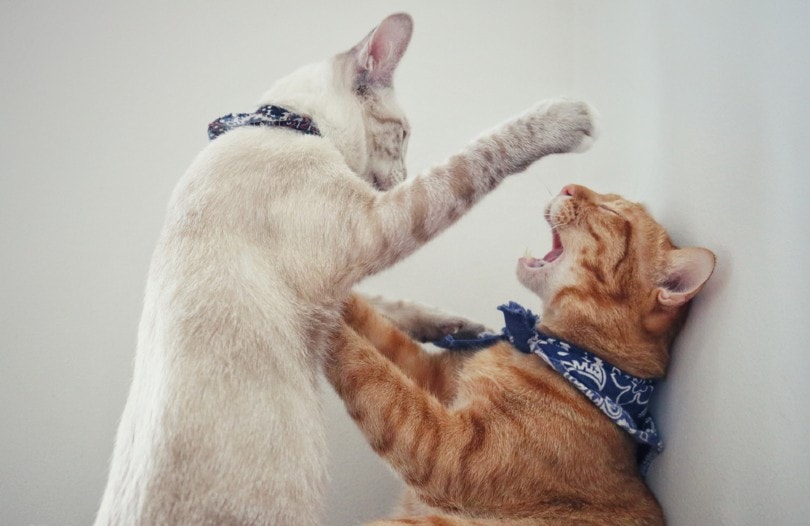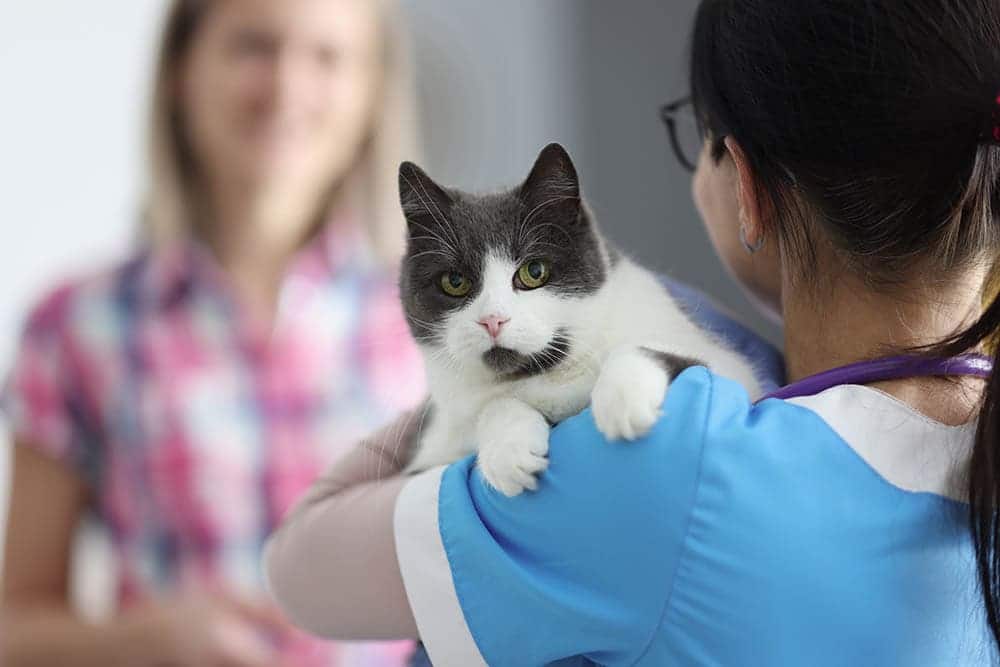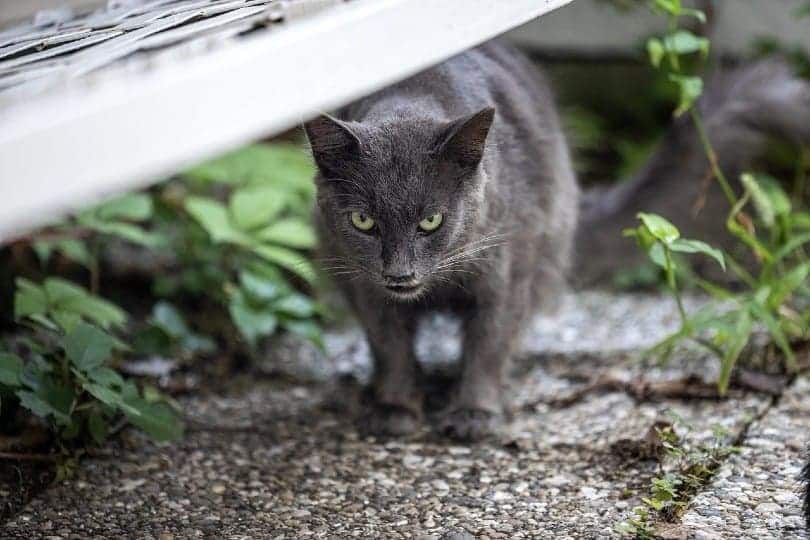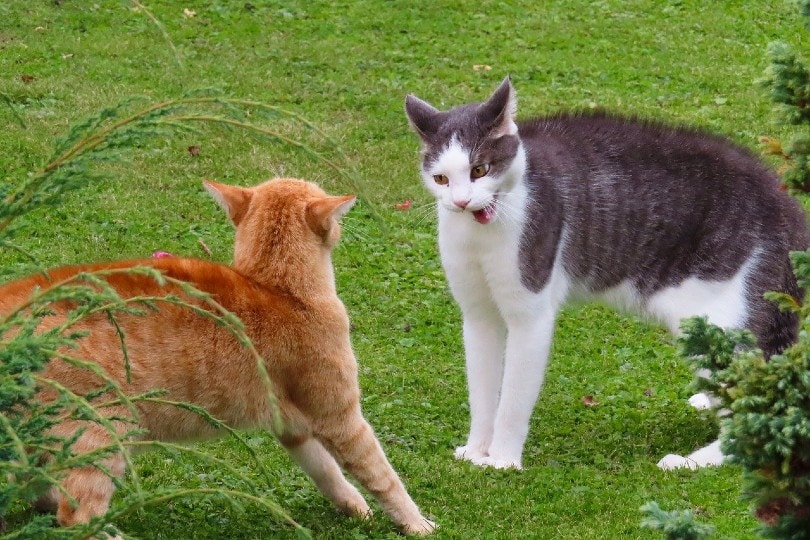There is something so disheartening about two best pals turning into enemies. If your cats have always gotten along but seem to be at each other’s throats all the time now, you know there has to be a reason. Sometimes, you just need to brainstorm a little to find out what that might be.
We’ll discuss five possible reasons why your cats might be quarreling. Plus, we will go into depth on specifics to dig deep into the underlying factors. Hopefully, with this insight, you can solve their worrisome woes and help them square their differences.

The 5 Reasons Your Cats Are Suddenly Fighting
1. Changes in Hormones
Let’s face it, every human being can relate to the power of hormone changes. You probably know just how unpredictable and troublesome they can sometimes be. Cats are no different. If you have two teen kitties going through a significant change, it could cause a ruckus for a while.
Sexual Maturity
Cats of the same sex might start getting very territorial. If you only have one cat sexually maturing, they might be a little testy, which can put other cats off. If the fighting hasn’t been an issue until after one of your cats is 6 months old, assume it’s the hormones.
- Solution: Schedule an appointment with your vet or local mobile clinic to get your kitty spayed or neutered.

Health-related Hormone Changes
Hormonal issues like hyperthyroidism and hyperadrenocorticism (Cushing’s disease) can cause all kinds of weird side effects, including sudden aggression with housemates.
- Poor coat quality
- Weight loss
- Lack of appetite
- Restlessness
- Increased thirst
- Solution: If you think your cat might suffer from hyperthyroidism, contact your vet. They will run bloodwork and other testing to determine the root cause.
2. New Stress Factors
Stress affects all creatures differently, including your kitties. If something has changed around the house and your cat is feeling uncomfortable about it, they might be taking it out on their buddy. Lots of things can cause stress in cats, and some might not be so obvious.
Some reasons might include:
Newcomers
Your cat might not be too keen on a new addition to the family, whether it’s a human or animal baby. Instead of taking things out on the problem, they might be very testy with a friend. You might see them acting tense and then snapping at the other kitty when they get near.

Household Changes
If you have recently moved or even moved the furniture, your cat might not be so happy. Sudden changes can cause behavioral issues like fighting amongst each other.
Work Schedule Changes
Did you recently start working a different shift, or even more or less than usual? Your cats might not be too keen on the new schedule. Their lack of understanding might cause moodiness which could lead to fighting.
Outside Ruckus
Has there been extra commotion happening outside of your house lately? They might really be irritated with what’s going on. Maybe a neighbor’s house is due for remodeling and they hear saws running all day. Or possibly, a neighborhood animal might irritate your cat.
If this is the case, it could cause conflict between your cats. But it usually would only happen while your cat is surveying the scene.
- Solution: Even though it might be a hard task, try to eliminate whatever is triggering the stress issue as much as you can. It might not change until your cat adapts, but the good news is that your cat is resilient and can typically roll with the punches. If the fighting is severe, you might want to create a lengthy separation followed by a slow reintroduction.
3. Underlying Health Issues
We all know what it’s like not to feel well. Some illnesses can cause pain, and our cats can’t communicate like us. So, it’s possible that an “ouch, that hurts!” comes out as aggression.
Other issues apart from pain can cause bad reactions, too. Some problems are neurological, which can affect your cat’s behaviorals response. A cat that is not feeling well is more likely to be easily irritated and therefore more likely to engage in a fight.

- Solution: Get your kitty to their vet right away. Your vet can perform the necessary tests to determine the underlying cause. Your vet will prescribe a medical treatment and should have some advice to help you deal with the issue.
4. Fearfulness
Your cats might have had good intentions but took things too far. It’s possible that one of them got a little rough during play, and now someone has the wrong idea. If it’s fear-based, there might be a back and forth war going on right now—with an easy solution.
If they feel the need to defend themselves, it can cause serious injury. Ultimately, your cats need a time-out to reset.

- Solution: Give your cats a time apart, each in a safe and comfortable space. If a cat got injured, please get your kitty to their vet right away. Your vet will prescribe a medical treatment and should have some advice to help you deal with the issue.
5. Dominance Issues
Sometimes, your cats might quarrel as to who is boss around the house. If you have one incredibly bossy cat, it could cause an upheaval eventually. Even though it’s normal for some cats to be more dominant than others, it has to be fair.
Dominance issues can sometimes stem from jealousy, so make sure you’re giving your cats enough of your time. It can also stem from a lack of socialization before 8 weeks. If that’s the case, you can still help your cat adapt to one another healthily.

- Solution: Your praise is key here. Make sure you are giving lots of positive attention to both of the kitties equally. Spend quality time showing affection to both and reward them when they react well to one another.
My Cat Is Hissing but Not Attacking
Maybe your cat isn’t full-blown attacking the other but is hissing. You might be wondering, “Why is my cat hissing at my other cat all of a sudden?”
If your cat is starting to hiss at others, a primary reason this happens is due to some physical pain. If your cat isn’t feeling too hot, they might not want another cat around who could make it worse.
Say you have an older cat that might be developing arthritis, then they might not want another cat to get near for fear of them getting hurt. It could be a surface wound or something internal that you can’t see.
Of course, it could also indicate that they aren’t in the mood to play. If you have a kitty who is advancing in years and another younger cat, it might just be incompatible energy levels.
If you have a sneaking suspicion that it is due to pain, make sure to schedule an examination at your vet.
Final Thoughts
It’s not a relaxed environment when both of your cats are sparring on the regular. Make sure you look for the root causes, especially if you think it requires veterinary attention. Sudden fighting is not normal, but it can be manageable with the correct solutions.
Once you pin down what’s upsetting your furry friends, you can put a stop to the problem altogether.
You might also like:
- How Does a Breakup Affect a Cat? Potential Ways & How to Help
- 10 Cat Breeds That Like Water (With Pictures)
Featured Image Credit: Samarskiy, Shutterstock











